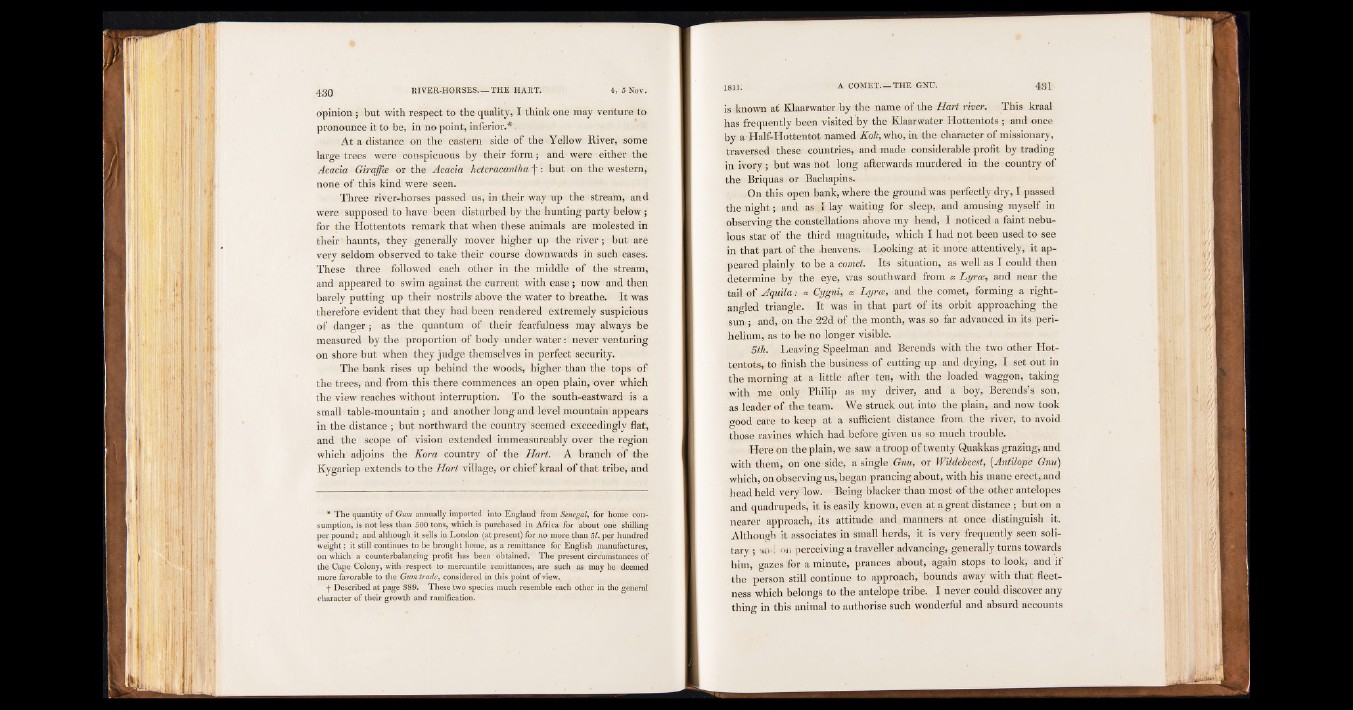
opinion; but with respect to the quality, I think one may venture to
pronounce it to be, in no point, inferior.*
At a distance on the eastern side of the Yellow River, some
large trees were conspicuous by their form; and were either the
Acacia Giraffes or the Acacia heteracantha f : but on the western,
none of this kind were seen.
Three river-horses passed us, in their way up the stream, and
were supposed to have been disturbed by the hunting party below;
for the Hottentots remark that when these animals are molested in
their haunts, they generally mover higher up the river; but are
very seldom observed to take their course downwards in such cases.
These three followed each other in the middle of the stream,
and appeared to swim against the current with ease ; now and then
barely putting up their nostrils1 above the water to breathe. It was
therefore evident that they had been rendered extremely suspicious
of danger; as the quantum of their fearfulness miay always be
measured by the proportion of body under water: never venturing
on shore but when they judge themselves in perfect security.
The bank rises up behind the woods, higher than the tops of
the trees, and from this there commences an open plain, over which
the view reaches without interruption. To the south-eastward is a
small table-mountain ; and another long and level mountain appears
in the distance ; but northward the country seemed exceedingly flat,
and the scope of vision extended immeasureably over the region
which adjoins the Kora country of the Hart. A branch of the
Kygariep extends to the Hart village, or chief kraal of that tribe, and
* The quantity of Gum annually.imported into England from Senegal, for home consumption,
is not less than 500 tons, which, is purchased in Africa for about one shilling
per pound; and although it sells in London (at present) for no- more than 51. per hundred
weight; it still continues to be brought home, as a remittance for English manufactures,
on which a counterbalancing profit has been obtained. The present circumstances of
the Cape Colony, with respect to mercantile remittances, are such as may be deemed
more favorable to the Gum trade, considered in this point of view.
f Described at page 389. These two species much resemble each other in the general
character of their growth and ramification.
is known at Klaarwater by the name of the Hart river. This kraal
has frequently been visited by the Klaarwater Hottentots ; and once
by a Half-Hottentot named Kok, who, in the character of missionary,
traversed these countries, and made considerable profit by trading
in ivory; but was not long afterwards murdered in the country of
the Briquas or Bachapins.
On this open bank, where the ground was perfectly dry, I passed
the night; and as I lay waiting for sleep, and amusing myself in
observing the constellations above my head, I noticed a faint nebulous
star of the third magnitude, which I had not been used to see
in that part of the .heavens. Looking at it more attentively# it appeared
plainly to be a comet. Its situation, as well as I could then
determine by the eye, was southward from «. Lyrce, and near the
tail of Jquila: a. Cygni, a. Lyrce, and the comet, forming a right-
angled triangle. It was in that part of its orbit approaching the
sun • and, on the 22d bf the month, was so far advanced in its peri-
helium, as to be no longer visible.
5th. Leaving Speelman and Berends with the two other Hottentots,
to finish the business of cutting up and drying, I set out in
the morning at a little after ten, with the loaded waggon, taking
with me only Philip as my driver, and a boy, Berends’s son,
as leader of the team. We struck out into the plain, and now took
good care to keep at a sufficient distance from the river, to avoid
frióse ravines which had before given us so much trouble.
Here on the plain, we saw a troop of twenty Quakkas grazing, and
with them, on one side, a single Gnu, or Wildebeest, (Antilope Gnu)
w h i c h , on observing us, began prancing about, with his mane erect, and
head held very low. Being blacker than most of the other antelopes
and quadrupeds, it is easily known, even at a great distance ; but on a
nearer approach,, its attitude and manners at once distinguish it.
Although it associates in small herds, it is very frequently seen solitary
; an.; Jjp perceiving a traveller advancing, generally turns towards
him, gazes for a minute, prances about, again stops to look, and if
the person still continue to approach, bounds away with that fleetness
which belongs to the antelope tribe. I never could discover any
thing in this animal to authorise such wonderful and absurd accounts